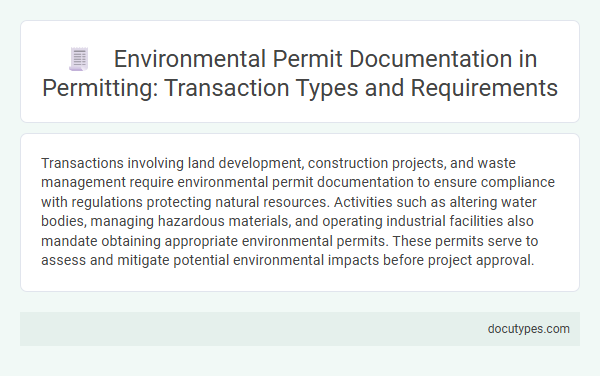Transactions involving land development, construction projects, and waste management require environmental permit documentation to ensure compliance with regulations protecting natural resources. Activities such as altering water bodies, managing hazardous materials, and operating industrial facilities also mandate obtaining appropriate environmental permits. These permits serve to assess and mitigate potential environmental impacts before project approval.
Introduction to Environmental Permit Documentation
Environmental permit documentation is essential for regulating activities that may impact the environment. Transactions involving land development, waste management, and air or water emissions typically require this documentation. Your compliance ensures environmental protection and adherence to legal standards during these operations.
Types of Environmental Permitting Transactions
Environmental permits are essential for regulating activities that impact natural resources and public health. Various types of transactions require specific environmental permit documentation to ensure compliance with legal and environmental standards.
- Construction and Development Projects - Projects involving land alteration or infrastructure development must obtain permits to control pollution and habitat disruption.
- Waste Management and Disposal - Transactions related to the handling, treatment, and disposal of hazardous or non-hazardous waste require permits to prevent environmental contamination.
- Industrial Emissions and Discharges - Facilities emitting air pollutants or discharging wastewater must secure environmental permits to monitor and limit harmful emissions.
Key Regulatory Frameworks Governing Permits
| Transaction Type | Key Regulatory Frameworks | Permit Documentation Requirements |
|---|---|---|
| Land Development and Construction | Clean Water Act (CWA), National Environmental Policy Act (NEPA) | Environmental Impact Statements (EIS), Stormwater Pollution Prevention Plans (SWPPP) |
| Hazardous Waste Management | Resource Conservation and Recovery Act (RCRA), Comprehensive Environmental Response, Compensation, and Liability Act (CERCLA) | Hazardous Waste Generator and Transporter Permits, Cleanup and Remediation Certifications |
| Air Emissions | Clean Air Act (CAA) | Air Quality Permits, Emission Control Plans |
| Water Discharge | Clean Water Act (CWA) | National Pollutant Discharge Elimination System (NPDES) Permits |
| Resource Extraction and Mining | Surface Mining Control and Reclamation Act (SMCRA), Mineral Leasing Act | Mining Permits, Reclamation Plans |
| Energy Production and Transmission | Federal Energy Regulatory Commission (FERC) Regulations, Energy Policy Act | Energy Facility Permits, Environmental Impact Reviews |
Your compliance with these key regulatory frameworks ensures that the required environmental permit documentation is appropriately secured for your transactions.
Essential Documentation for Initial Permit Applications
Environmental permits are mandatory for transactions that involve construction, industrial operations, waste disposal, and land development activities. These transactions require thorough documentation to demonstrate compliance with environmental regulations and standards.
Your initial permit application must include essential documents such as environmental impact assessments, site plans, and proof of public consultation. Detailed descriptions of the proposed activities, pollutant discharge information, and mitigation measures are crucial for approval.
Requirements for Permit Renewals and Modifications
Environmental permits are necessary for transactions involving construction, industrial operations, waste management, and land development that impact air, water, or soil quality. Requirements for permit renewals include submitting updated environmental impact assessments and compliance reports to demonstrate adherence to regulatory standards. Modifications to permits demand detailed documentation of changes in project scope or technology, ensuring continued protection of environmental resources.
Environmental Impact Assessments in Permit Transactions
Environmental permit documentation is essential for transactions involving land development, industrial projects, and resource extraction that may impact ecosystems. Environmental Impact Assessments (EIAs) play a crucial role in these permits by evaluating potential environmental risks and ensuring compliance with regulations.
Projects such as construction, mining, and waste management typically require detailed EIAs to obtain permits. These assessments analyze factors like air and water quality, biodiversity, and soil conditions to minimize negative effects. You must provide comprehensive EIA reports during permit applications to facilitate regulatory approvals and sustainable project implementation.
Common Supporting Documents for Permit Approval
Environmental permits are essential for specific types of transactions, including industrial facility operations, waste management activities, and construction projects that impact natural resources. You must ensure that your project complies with environmental regulations to avoid legal complications and penalties.
Common supporting documents required for permit approval include environmental impact assessments, site plans, and pollution control measures. Additional documents like water and air quality reports, hazardous materials handling procedures, and proof of public consultation may also be necessary to demonstrate compliance.
Digital Submission and Record-Keeping Standards
What types of transactions require environmental permit documentation for digital submission and record-keeping? Industrial emissions, wastewater discharge, and hazardous waste management typically necessitate environmental permits. Your digital submissions must comply with regulatory standards to ensure accurate, secure, and accessible record-keeping.
Compliance and Reporting Obligations in Permitting
Certain transactions necessitate environmental permit documentation to ensure adherence to regulatory standards and protect natural resources. Compliance and reporting obligations play a critical role in the permitting process for these activities.
- Industrial Facility Operations - Enterprises conducting manufacturing or chemical processing must provide environmental permits to demonstrate control over emissions and waste management.
- Land Development and Construction - Projects involving site alteration, such as excavation or filling, require permits to comply with erosion control and habitat preservation regulations.
- Waste Treatment and Disposal - Activities dealing with hazardous or non-hazardous waste need documentation to meet disposal guidelines and minimize environmental impact.
Accurate permit documentation supports compliance monitoring and facilitates transparent environmental reporting obligations.
What Types of Transactions Require Environmental Permit Documentation? Infographic

